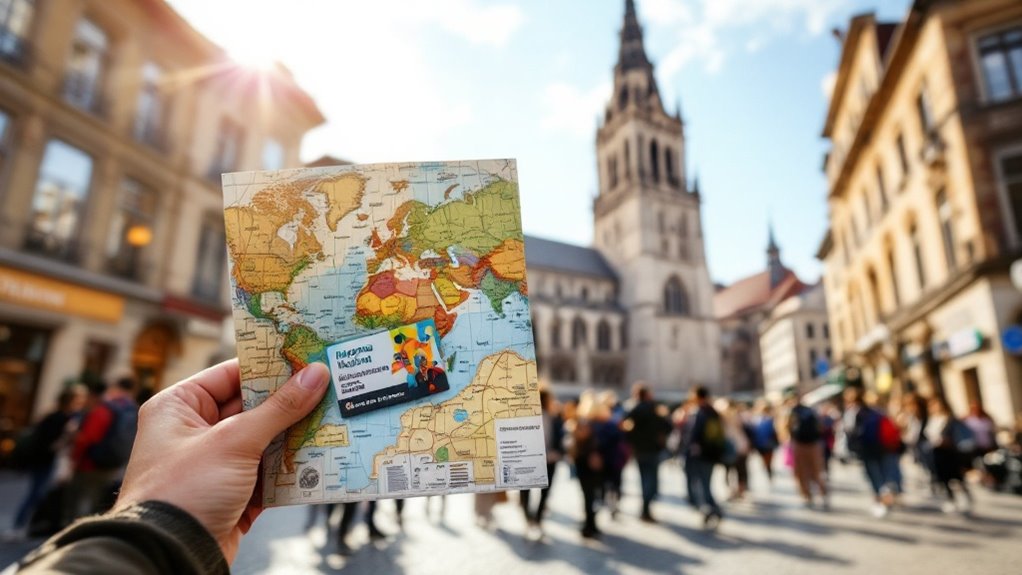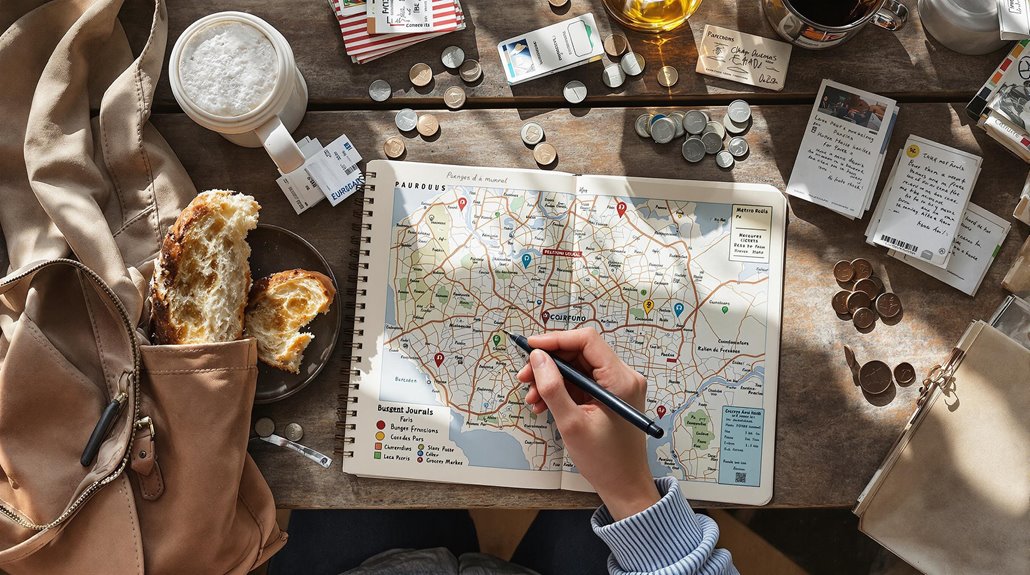You're about to initiate the adventure of a lifetime, but your bank account shouldn't take a nosedive while you're studying abroad. Whether you've chosen the bustling streets of Tokyo or the historic lanes of Prague, smart budgeting will transform your experience from constant penny-pinching to confident exploring. With the right financial strategy, you'll reveal hidden gems, savor local flavors, and create unforgettable memories—all while keeping your wallet intact. Let's explore eight proven ways to make it happen.
- Key Points
- Research Cost of Living Before You Go
- Create a Detailed Monthly Spending Plan
- Choose Budget-Friendly Housing Options
- Master Local Transportation Systems
- Find Student Discounts and Free Activities
- Cook Meals at Home and Shop Local Markets
- Plan Weekend Trips Strategically
- Set Up Smart Banking and Currency Exchange
- The Sum Up
Key Points
- Create a detailed monthly spending plan dividing expenses into essential categories like tuition, housing, groceries, and transportation.
- Utilize student discounts through ISIC cards and local apps for reduced rates on travel, accommodation, and cultural experiences.
- Choose budget-friendly housing options like shared apartments or homestays, and start searching early through trusted websites.
- Book transportation and accommodations in advance through budget airlines and hostels to secure better deals.
- Set up a student-friendly bank account that minimizes international fees and offers extensive ATM networks abroad.
Research Cost of Living Before You Go

How much will your dream study abroad experience actually cost? Before you pack your bags for that life-changing adventure, you'll need to dive deep into the cost of living at your chosen destination.
From the bustling streets of Berlin to the beaches of Malaysia, expenses can vary dramatically. You'll want to research tuition fees first – they're often your biggest expense. Cities like Warsaw and Vienna have emerged as more budget-friendly alternatives for international students.
Study abroad costs swing wildly between destinations – start by comparing tuition fees, as they'll take the biggest bite from your budget.
While Germany and Sweden offer nearly free education, studying in Australia or the UK requires a heftier budget. Don't forget to factor in monthly living costs, which range from $700 in Brazil to over $1,650 in New Zealand. Mastering your finances is crucial for a successful semester abroad.
Keep an eye on currency exchange rates, as they'll impact your purchasing power. Use resources like Studee.com and government websites to compare costs, and check student forums for real insights from those who've already taken the leap.
Create a Detailed Monthly Spending Plan
Now that you've researched your destination's costs, it's time to map out your study abroad financial journey with a thorough monthly spending plan.
Start by categorizing your expenses into essential buckets: tuition, housing, groceries, transportation, and that vital travel fund for weekend adventures.
Break down your monthly allowance into specific categories, allocating funds for daily necessities like your morning coffee runs and metro passes.
Don't forget to factor in emergency money for unexpected situations. If you're planning weekend getaways, earmark $150-200 per trip for activities, and book transportation early to snag better deals.
Use budgeting apps to track every expense, and consider your lifestyle preferences – whether you'll be dining out frequently or cooking at home. Consider staying at affordable hostels that typically cost between $10-25 per night when traveling to keep accommodation costs low. Explore budget-friendly transportation options like walking, biking, or public transit to save on daily commutes.
Remember to include funds for local cultural experiences that'll make your study abroad truly unforgettable.
Choose Budget-Friendly Housing Options

Finding the perfect home base for your study abroad adventure can make or break both your budget and experience.
Your study abroad housing choice is the cornerstone of your entire experience – choose wisely to protect both memories and money.
You'll discover a range of wallet-friendly options, from vibrant shared apartments to culturally immersive homestays. Consider exploring student-rich cities like Chicago, Austin, or Philadelphia, where affordable housing near universities thrives. Essential tips for finding student housing in London can provide helpful guidance as you navigate the housing landscape in popular study abroad destinations.
Start your housing search early and tap into student networks to uncover hidden gems. Using trusted websites like Fly Homes can help you find detailed listings with specific addresses and weekly prices.
Whether you're drawn to on-campus convenience or off-campus independence, prioritize safety, transportation access, and included amenities.
Don't forget to check if your financial aid covers housing costs.
If you're looking to stretch your budget further, consider sharing accommodations – you'll not only save money but also build lasting friendships with fellow international students while creating unforgettable memories in your home away from home.
Master Local Transportation Systems
Three essential keys reveal the secrets of local transportation in your study abroad destination: research, technology, and cultural awareness.
Start by downloading local transit apps and familiarizing yourself with route planning tools like Google Maps. You'll want to master the basics of your host city's metro, bus, or tram systems before arrival. Taking time to observe local practices will help you understand the unwritten rules of public transportation.
Dive into local transit etiquette – learn key phrases, understand priority seating rules, and observe how locals navigate the system. Budgeting for your study abroad trip is essential to making the most of your experience.
To maximize your budget, investigate student discounts and compare costs between single tickets and monthly passes. Don't forget to factor in occasional taxi rides for late nights or emergencies.
Stay flexible and embrace the learning curve. You'll make mistakes, but each navigation challenge brings you closer to mastering your temporary home's transit network.
Find Student Discounts and Free Activities

Smart student travelers know that accessing discounts and free activities can transform your study abroad experience from budget-draining to budget-friendly.
Study abroad doesn't have to break the bank – savvy students transform their international adventures through smart money-saving strategies.
Take advantage of your student status by securing airline discounts through carriers like Emirates, offering up to 10% off fares and extra luggage allowance, or grab Amtrak's 15% discount for train travel. Mastering Your Study Abroad Budget can help you plan for total study abroad expenses.
Dive into the local scene by joining free walking tours, exploring public parks, and attending cultural events.
You'll want to get an ISIC card for global discounts and download local apps to discover hidden deals.
Don't forget to check StudentUniverse for reduced rates on flights and accommodations.
When planning your adventures, combine budget-friendly tactics like group travel for shared costs and free university events. Youth tickets from Scandinavian Airlines are perfect for travelers aged 12-25, requiring only your birthdate for verification.
Follow local businesses on social media to catch flash deals and special student promotions.
Cook Meals at Home and Shop Local Markets
Beyond snapping up student discounts, one of the most impactful ways to stretch your study abroad budget lies right in your kitchen.
You'll discover that cooking meals at home isn't just wallet-friendly – it's a gateway to culture and healthier living while studying abroad. Research shows that traditional recipes are often healthier alternatives for international students. Plus, savoring local cuisine can provide a more authentic cultural experience.
Head to local markets where you'll find fresh produce at competitive prices, perfect for crafting both familiar comfort foods and exploring local recipes.
Plan your meals weekly, create detailed shopping lists, and don't shy away from buying staples in bulk.
You'll save markedly by cooking large portions and freezing leftovers for busy days.
Plus, you're not just saving money – you're developing life skills, understanding local ingredients, and creating opportunities to share authentic cultural experiences with new friends through home-cooked meals.
Plan Weekend Trips Strategically

While studying abroad opens doors to countless destinations, strategic weekend trip planning can transform your travel dreams into reality without draining your bank account.
Book your flights early through budget airlines like Ryanair and EasyJet, as prices typically surge closer to departure dates. You'll find better deals on hostels and Airbnbs by securing accommodations in advance, especially when traveling with friends to split costs.
Consider mixing up your transport options – trains and buses often prove more economical for shorter distances, while car-sharing apps can offer unexpected adventures. Having access to a kitchen in accommodations helps reduce daily expenses by allowing you to prepare some meals yourself. Unlock Affordable Adventures: Tips for Budget Travel provides a comprehensive guide with 34 unique strategies for budget travel.
When you arrive, learn about the local scene through free walking tours and authentic eateries away from tourist hotspots. Don't forget to flash your student ID for discounts at attractions and embrace public transportation to maximize your budget while exploring new cities.
Set Up Smart Banking and Currency Exchange
Steering through the financial waters of study abroad becomes infinitely smoother when you've got your banking and currency exchange strategy locked down before takeoff.
Set yourself up with a student-friendly bank account that won't drain your funds with hefty fees. You'll want to contemplate virtual banks like Monese or Transferwise if you're facing residency requirement hurdles. Having proper documentation ready, including your passport, visa, and proof of address, will streamline your banking setup process.
For currency exchange, download apps like Xe to track real-time rates and make savvy conversion decisions. When choosing your banking solution, prioritize those offering robust international services and extensive ATM networks near your campus.
Consider using Revolut for European adventures or Zolve for U.S.-bound studies. These platforms often provide better exchange rates and lower transaction fees than traditional banks.
Remember to exchange larger amounts when rates are favorable to maximize your study abroad budget.
The Sum Up
Your study abroad journey is like a vibrant tapestry, woven with experiences and memories that'll last a lifetime. By following these budget-savvy strategies, you're not just stretching your dollars – you're crafting a masterpiece of smart travel. Think of your budget as your compass, guiding you through unexplored territories while keeping your financial bearings. Now spread your wings and soar into this incredible adventure, knowing you've got the tools to thrive.

